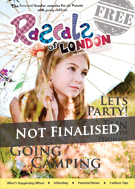Teaching your Child to Read
By Isabelle Parasram

We all know how important it is for our children to learn to read, but, how do we help them do it in the midst of a busy life? And what happens if we don’t actually like reading ourselves? Or, if we do like reading, how do we share that love with our children?
In our family, we are all book lovers, apart from my husband, Clyde, who doesn’t even read beyond the first line of a text message if he can avoid it! I genuinely believe that, if our children hadn’t been exposed to the environment we’ve created for them, not all of them would have become addicted to books in the way that they have done. Even though Clyde doesn’t really like reading, he knows the importance of it. We both work really hard – in two completely different ways - to ensure that our children grasp this key skill for life.
So…here’s how you can support…
Your 0-2 year old:
1. Let your child see you reading – he will copy you! My one year old, Theo, often sits on my lap whilst I’m reading and he is picking up so much just by watching me (for example, that pages are turned from left to right).
2. Read to him – but, if you don’t like doing this, don’t feel pressured by everyone else to do it, just because you ‘have’ to. Why not ask a family member or friend who enjoys reading out loud to stand in for you sometimes? They will probably be honoured that you asked.
3. Ensure that your baby is able to access books easily – keep a supply of books at child height and allow them to choose their own books. We keep our children’s books in wheeled containers under their beds.
4. Offer your baby a selection of books to read whilst you are doing your household chores. Whilst I am packing the schoolbags, Theo will often sit in his high chair reading books, throwing books, chewing books or even writing on books. The fact that he’s touching them and getting entertainment from them is the start of a good relationship with books (respect for books will come later)!
5. For babies, choose interactive books with different textures, googly eyes, flaps to lift, puppets attached etc. A book like this will meet your baby’s need for exploration and experimentation – this is a great foundation for your child to believe that books are fun.
Your 3-5 year old:
This is what I call ‘the latent phase’ of reading. It can be the most discouraging for both you and your child, but the turning point is just around the corner! During the latent phase, you may feel as if you are pouring in lots of effort, but seeing very little impact. Keep going - on that golden day that your child recognises her first word, you will see the fruit being borne from all the little seeds you have been sowing.
1. Play games that will teach your child phonics such as ‘I Spy’. Ask your child to look for things beginning with the phonics alphabet - instead of saying the name of the letter ‘S’, make the sound of a snake: ‘sssss’. Phonics is based on the sound of a letter, not its name.
2. Give your child books to read with simple words in it, but don’t expect or request that they read the words, ask them instead to look at the pictures and tell you what is happening. This is crucial in learning to read as, later on, your child will learn to guess how to read a word from looking at what is happening in the pictures. So, even if you don’t like reading words, you can still help your child to enjoy books by discussing what’s happening in the pictures.
3. Allow for very long pauses when your child is ‘reading’ – they may spend an inordinately long period of time just looking at one page. It’s a great sign when a child spends a long time staring at a page – they are taking in the details of the pictures and looking at the shapes of the words. Your patience at this point (even if it’s pretend patience!) is demonstrating that books are to be enjoyed and savoured – slowly if need be.
4. As your child begins to read his first words, pick out the tricky words that can’t be ‘sounded out’, such as ‘said’, ‘they’ or ‘your’, then laminate 2 sets of them onto coloured card so you can play ‘Snap’ with your child. I do this with Carl, my 5 year old, in the 5 minutes before we walk to school or, if I’m still frantically packing my briefcase and looking for Carl’s PE kit, I bribe my 8 year old to play Snap with Carl instead!
5. Show your child the role that reading plays in your life so that he grasps the importance of it. A few examples of this:
a. Clyde will often point to road signs and then exaggerate his reading of them to show that, without reading those signs, he couldn’t figure out where he is going (for the purpose of this exercise, you need to suspend your belief in the Sat Nav!)
b. Carl loves baking cupcakes with me, so I often ask him to read the recipe, ‘so that I know what ingredients to use.’ Carl will often protest that he doesn’t know how to read, then I remind him that he is fantastic at interpreting pictures, which is reading. He will often rise to my expectation of him by looking at the photo of flour and eggs and then advising me that I need 4000g of eggs and 12 bags of flour. Does it matter that he’s got the amounts wrong? No. Does it matter that he feels he has contributed to our fun by reading in the only way he knows how? Yes, yes and yes again!
c. I sometimes write little notes to my children and put them in their school bags. For Carl, I write very simple messages in non-joined up writing. After receiving a note that says, ‘Mama loves Carl’ twenty times, Carl has finally figured out what it says and it boosts his confidence if he feels he can read it. The Star Wars picture that I paste onto the note may be the only thing that persuades him to actually open it, but who cares? d. When we get into a lift, Clyde often asks our 3 year old, Zachary, to press the button for the Ground floor or to open the doors. Zac is not only learning to read the symbols, Clyde also lavishes Zac with praise along the lines that, if Zac hadn’t recognised the letters and pressed the right buttons, we wouldn’t have got to our destination.
6. Encourage your child to read the same book over and over again until he can almost recite it – it is all part of building his confidence. If he chooses to read the same book over and over again and it wasn’t a part of your plan to read Mig the Pig three hundred times, remember that repetition builds confidence and familiarity for your child and console yourself with the fact that your new talent may come in handy at parties someday!
Your 6 - 8 year old:

1. Continue to read to her, even if she can read – I still read to my 8 year old daughter, Jemima, but now, I ask her questions about the book she is reading. She loves the fact that she’s ‘teaching’ me and that I’m genuinely interested in her thoughts and ideas on the story. Often, I have absolutely no interest in how The Famous Five solved their mystery, but I am interested in why Jemima chose that particular book, or who her favourite character is.
2. Discuss your own reading books with your child – though this can be somewhat difficult, depending on your reading material!
3. Get your child to fill in their own forms. With four sets of forms to fill in every time I want to register my children for anything, I have discovered that it is far quicker if Jemima fills in her own forms. In doing so, Jemima is forced to read the questions and she also learns that reading can achieve a goal e.g. getting a Trinidadian passport so we can more easily visit our relatives.
4. Encourage your child to take a book with them wherever they go – my children have learned to spend their ‘dead’ time reading e.g. in queues for the bank.
5. Choose a school for your child that will foster her enjoyment of reading. My daughter’s school has worked wonders in encouraging her to read – bringing in famous authors to read to the children, holding a Book Fair, running sponsored book reading challenges, giving house points for a child who reads every day in a month etc.
As for older children, I can’t yet comment on how to support them - reading is a journey, but, what I’ve discovered is, it’s as much a journey for me as it is for my children…
Isabelle Parasram is the mother of four children aged 1-8. She is also a barrister, a College Assessor of Childcare and Education, an NCT- trained antenatal teacher, the Director of a large children’s day Nursery & Out of School Club in Tower Hill and is a Trustee of a Community Nursery in Shadwell. She would love to answer your questions or to have your comments on her article. Please e-mail her at: myDreamMaker@me.com You can also read more about her at www.mydreammaker.co.uk.




